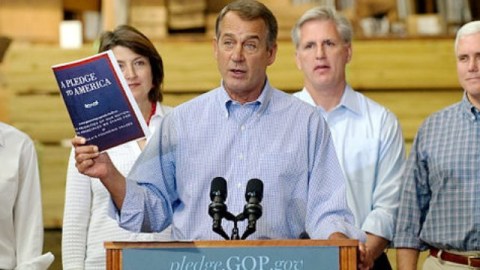Frank Luntz Compares GOP’s 2010 “Pledge” to 1994 “Contract”

In 1994, as part of their successful gambit to gain control of the House, Newt Gingrich and other GOP leaders issued the “Contract with America,” a promise to pass eight reform and transparency measures on the first day Republicans took control and then in the first 100 days introduce ten bills to cut government programs, decrease crime, and boost national security. Just 860 words in length, pollster Frank Luntz was the man responsible for the document’s “messaging,” figuring out the words and the frames that sold the promise to voters. In a pre-Web era, the document was introduced to targeted voters by way of a tear away insert at TV Guide.
In an op-ed at the Washington Post today, Luntz evaluates the GOP’s 2010 Pledge to America against the 1994 Contract. Among critiques, Luntz says that he would have called the 584 word document a “commitment” rather than a “pledge.”
First, their names: “A Pledge to America” vs. the “Contract With America.” I have to give the edge to the 1994 version, though I have an even better word. Nobody trusts political promises or politicians’ pledges, but a “commitment” suggests seriousness and a willingness to put your reputation on the line. I conducted polls on this wording this year, and an overwhelming 81 percent of Americans preferred a “commitment,” while just 10 percent chose a “promise” and only 9 percent a “pledge.”
The American people in 2010, above all else, want politicians to demonstrate that Washington works for America, not the other way around. The full-page, double-sided, tear-out ad for the Contract With America that ran in TV Guide in October 1994 did just that, featuring two simple but powerful sentences: “A campaign promise is one thing. A signed contract is quite another.” The authors of the 2010 document could have done better than “pledge.”
Another critique by Luntz is that the pledge offers no specific course of action, something Luntz calls a “glaring omission.” He also thinks that the Pledge is more strongly partisan and anti-government than the Contract, though lauds the Pledge for capturing the feeling of independents when asserting that the country is currently controlled by “an arrogant and out-of-touch government of self-appointed elites.”
In his weekly address, titled “A Crossroads on the Economy,” President Obama had a very different take on the Pledge: “”It is grounded in the same worn out philosophy: cut taxes for millionaires and billionaires; cut the rules for Wall Street and the special interests; and cut the middle class loose to fend for itself. That is not a prescription for a better future. It is an echo of a disastrous decade we cannot afford to relive.”
You can watch Obama and the White House’s response below:





